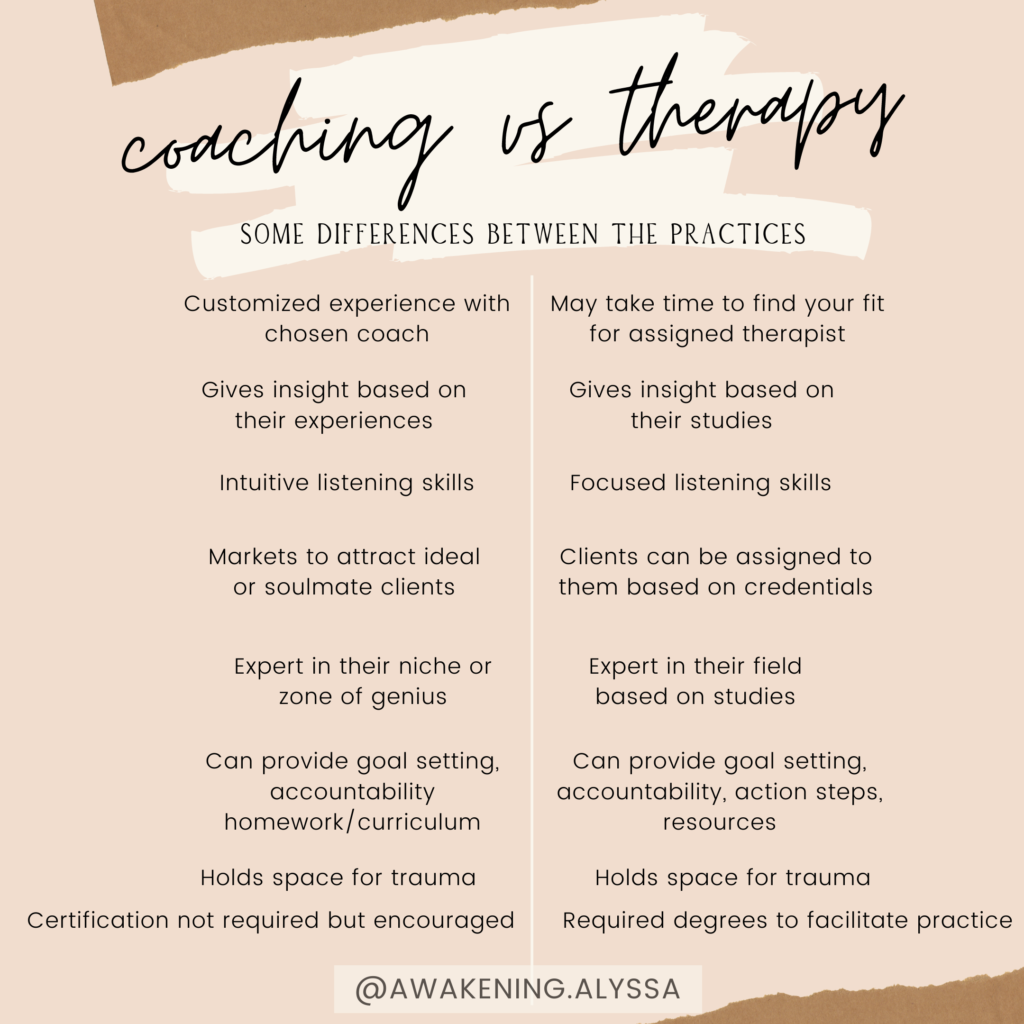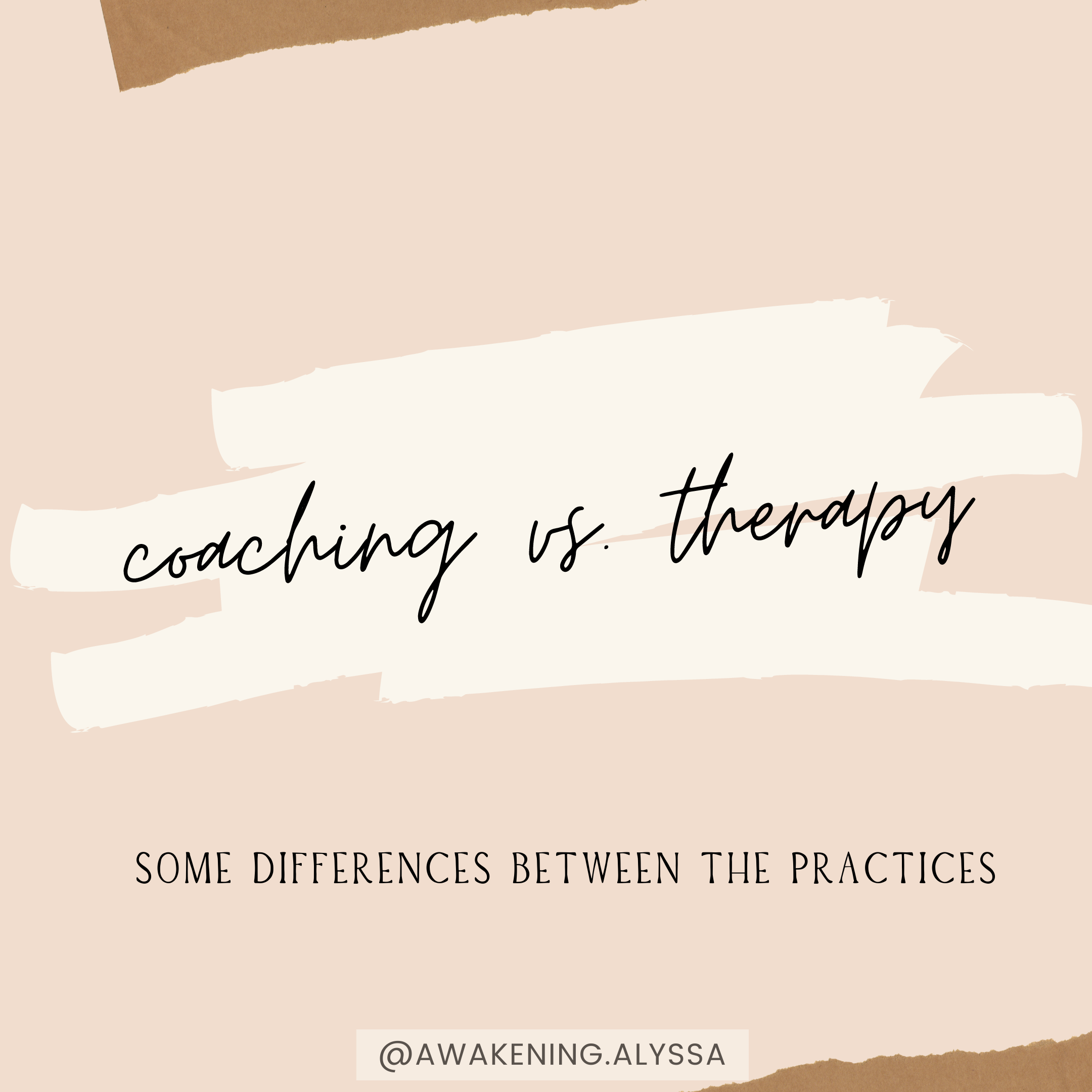Hello hello + welcome to the Aura Awakening Portal! If we’re just meeting, my name is Alyssa and I am a holistic life coach. I’m inspired to write this blog post today about some of the differences between the practices of coaching and therapy.
To preface, this is coming from a professional life coach who is currently enjoying the experience of virtual therapy. In the past when I was a pre-teen, I had a pretty disgruntling experience with a therapist who invalidated my feelings and dismissed them as me complaining. I’m grateful throughout this period of time of Covid-19, I’ve sought out virtual therapy for my own struggles with self worth, body image, anxiety and balancing a healthy productive nature. Along with couples therapy, for my 6-year relationship that was close to ending.
I’ve been coached by numerous coaches, however the experience is always different for me because I am in the space of coaching myself. I gathered some thoughts and added them to a little graphic to shed some light on the main differences I’ve noticed between coaching and therapy thus far.

Coaching: Customized experience with chosen coach.
The beauty of coaching is that you are hiring your coach with what you truly need their assistance in! (It is also an approach to apply to be coached, meeting for a discovery call and then agreeing to work together) This can be a slew of things from business, to weight loss, to trauma healing, to social media. Have a pain point? There’s a coach who specializes in it, and it usually is a customized experience, meaning your coaching (1:1 or group) is pertaining to your growth or healing in that specific area.
Therapy: May take time to find your fit for assigned therapist.
In my experience, through an initial consultation you share why you are seeking therapy and there will be a therapist that is assigned to you based on their education, credentials and availability. I caution that it may take time to find your fit because well, you may not like your therapist and that’s okay. Therapy is a space where you have to be very vulnerable and comfortable with your practitioner and it’s okay to put a pause and try to find a new fit if you’re experiencing stress from whom you’re meeting with.
Coaching: Gives insight based on their experiences.
Most of the time when hiring a coach, they are someone who’s just a few steps ahead of where you want to be. They aren’t perfect by any means but they’ve made some strides to be in a position to guide you to where you desire to be within your business, health, boundaries, etc. To me, coaching can be more conversational, developing a loving relationship with someone you look up to and inspires you. Chances are, you follow your coach on Instagram (or found them on there) when you would rarely ever connect with your therapist on social.
Therapy: Gives insight based on their studies.
Now, this doesn’t mean coaches don’t give insight on their studies or zone of genius. This means that therapists usually aren’t encouraged to give too much of their biases when providing insight on your area of desired healing. It’s safe to say that they keep things very general and focused on the client, rather than sharing a personal story of how they can relate to your struggles and how they’ve come out stronger on the other side. For example, my couples therapist never references her own relationships or others relationships when discussing my relationship with my partner. She’s actually helpfully given us resources like a book and handout to share insight from her studies.
Coaching: Intuitive listening skills.
Chances are you have a very intuitive coach that speaks your language. They’ve been where you have, and they feel your pain. Even if you don’t share many things in common (one of my clients is a mother and I am not), you go to your foundational teachings to help your client based off of your intuitive hits when sharing about their struggles.
Therapy: Focused listening skills.
Similar to my last point, the therapist is focused on your narrative, word choice and the emotions that come up when speaking about triggers/pain points. Coaches do this well too, however often times, the therapist will repeat back to you, reassuring that they’re understanding before analyzing why you’re feeling the way you’ve just described.
Coaching: Markets to attract ideal or soulmate clients.
Coaches spend a lot of time, energy and research marketing, refining their messaging, honing in on their niche and identifying the pain points of their ideal client. They know how they want to serve, who they want to serve and in what way they will facilitate the service through their unique offerings. Coaches are entrepreneurs first, coaches second.
Therapy: Clients can be assigned to them based on credentials.
Therapists typically work for a firm, collective, associate, establishment or office that has numerous therapists on staff. Some do work for themselves in a home office, however clients are usually assigned to them based on their credentials that they’ve studied and specialize in Examples are social work, art therapy, anger management, addiction recovery, child therapy, grief and couples counseling.
Coaching: Expert in their niche or zone of genius.
Niches. They’re a necessary part of how to narrow down which coach is a fit for you. If you’re seeking a coach to help you lose weight, you may not want to hire a business coach. Niches help identify the zone of genius that the coach thrives in, and sometimes it dips into a few areas which is okay. Either way, trust that your potential coach is an expert in their field and is always continuing their education to sharpen their skills.
Therapy: Expert in their field based on studies.
Usually, therapists find a specific area that they study to earn their degrees and begin their practice there. Again, some examples are disorder recovery, anger management, addiction recovery, teen/child therapy, grief and couples counseling. These specialties can require numerous sessions, maybe even years of counseling. I would argue that coaching isn’t quite like that because your job is to alleviate their pain, empower them to take action steps and reach their desires in a faster time frame than they would achieve without your guidance.
Coaching: Can provide goal setting, accountability homework/curriculum.
The fun part about being a coach is creation. Often times, coaches create customized workbooks, courses, curriculum and accountability check ins for when you aren’t meeting. Coaching sessions are often times facilitated every two weeks in a committed program with an amount of promised sessions.
Therapy: Can provide goal setting, accountability, action steps, resources.
My therapist and I have been setting goals together based on some of my frequent areas of discomfort that I have expressed. For example, we’ve been working on my self worth and she prompted me in the next week to think about what I deserve and see what comes up for me. My couples therapist provided my partner and I with a book recommendation and a 16-page handout to read before our next session. Therapy is encouraged to meet once a week, at the same time every week.
Coaching: Holds space for trauma.
Therapy: Holds space for trauma.
Coach, mentor, therapist, counselor, intuitive guide. Whatever you want to call yourself, please educate yourself on ‘holding space’ and being trauma informed. Remember my experience I shared with a therapist when 12-year-old me was feeling invalidated? She told me that I was complaining and overreacting. That’s a no-no and your client’s need to be heard, seen and respected comes first.
Coaching: Certification not required but encouraged.
This one is tough, because I wholeheartedly believe that coaches need to be certified to facilitate business legally. Unfortunately this isn’t the case, so please advise this fact when seeking to hire a coach or thinking about becoming a coach yourself. With coaches also being entrepreneurs, investing in themselves is the first step they can take to educate themselves and show up for their purpose.
Therapy: Required degrees to facilitate practice.
According to google, to become a therapist, students must complete a bachelor’s degree and a master’s degree. Some therapists also earn a doctorate. On average, undergraduate therapy programs take four years to complete. A master’s degree takes two years, while a doctorate requires four years.
I hope this helps you understand the differences between a coach and a therapist. Both practices are extremely healing, rewarding and nourishing. I would recommend both practices to anyone, but my goal in this article was to share some key points when deciding what your best fit is while you’re on your healing journey.

Comments +